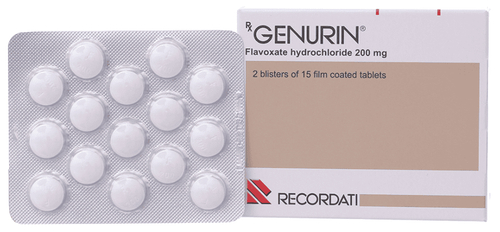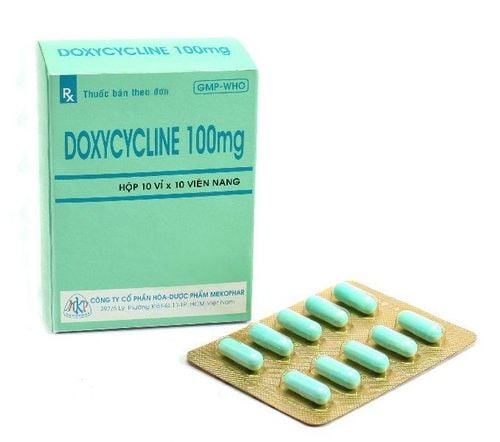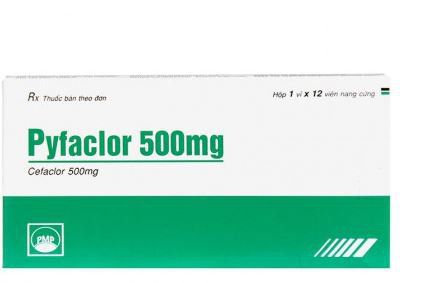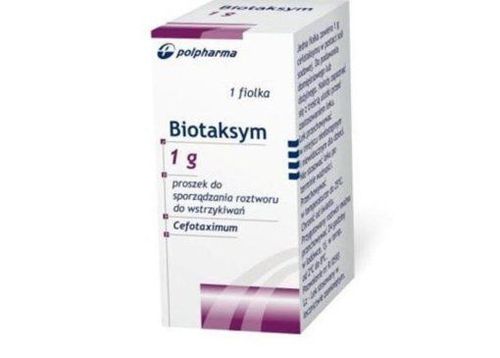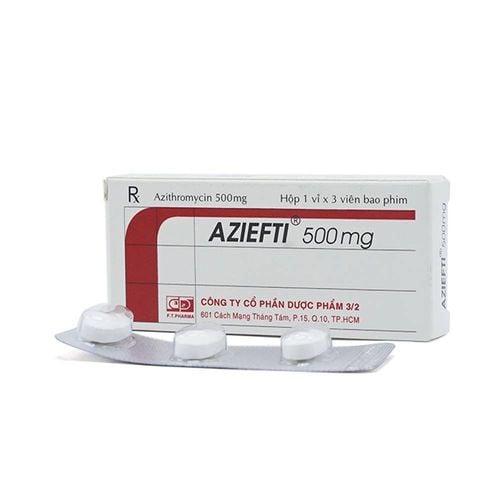This is an automatically translated article.
Roxiphar contains the main ingredient is a semi-synthetic Macrolide antibiotic, used in the treatment of bacterial infections of the tonsils, sinuses, ears, nose, throat, skin, soft tissues and lungs.1. What is Roxiphar?
Roxiphar contains the main ingredient Roxithromycin with a strength of 50mg. Belongs to the group of drugs that treat parasites, infections, viruses, and fungi. Roxiphar is often indicated for the treatment of infections such as:
Treatment of diseases related to urinary tract infections - genitourinary such as cervicitis, prostatitis, vaginitis, urethritis, salpingitis, particularly caused by Chlamydia infection. Treatment of diseases related to ear, nose and throat infections such as otitis media, tonsillitis, esophagitis, pneumonia, bronchitis, sinusitis. Treatment of diseases associated with skin and soft tissue infections such as dermatitis, cystitis, boils, toxic boils, pyoderma, erysipelas, ulcers caused by infection. Treatment of oral infections. Treatment of lower respiratory tract infections, typically pneumonia, chronic bronchitis, atypical pneumonia. Upper respiratory tract infections such as sinusitis, pharyngitis, tonsillitis. Mechanism of action:
Roxithromycin is a semi-synthetic Macrolide antibiotic, which is more effective against some Gram-negative bacteria, especially Legionella pneumophila. Roxithromycin is antibacterial by binding to bacterial ribosomes and interfering with bacterial protein synthesis. Therefore, Roxithromycin is effective in preventing the growth of bacteria that cause infections.
2. Dosage and how to use Roxiphar
How to use: Roxiphar is prepared in the form of a powder, used orally. In order for Roxiphar to be best absorbed into the body, the patient should take the drug on an empty stomach, preferably 1 hour before or 2 hours after eating. By fasting drug, Roxithromycin is absorbed very quickly and diffuses into most tissues and phagocytic cells.
Dosage:
Dosage for adults: Apply a daily dose of 300mg divided into 2 times.
Dosage for children: Apply a daily dose of 5-8mg/kg/day, divided into 2 times.
For children from 6-11kg: Apply a daily dose of 1/2 pack x 2 times/day. For children from 12 - 23 kg: Apply a daily dose of 1 pack x 2 times/day. For children from 24 - 40 kg: Apply a daily dose of 2 sachets x 2 times/day. Note: In children, the drug should only be used for a maximum of 10 days.
Contraindications : Do not use Roxiphar with patients who are allergic to Roxithromycin or any of its ingredients.
3. Side effects of Roxiphar
Mild reactions during treatment with Roxiphar:
Most of the common undesirable side effects when treated with Roxiphar affect the gastrointestinal tract with common symptoms such as diarrhea, nausea, abdominal pain and vomiting. Less common side effects affecting the central or peripheral nervous system include headache, dizziness, and rash. Effects on the liver with symptoms of elevated transaminase levels or risk of cholestatic hepatitis. Some of the more serious side effects include:
Fever blisters and bleeding in the lips, eyes, mouth, nose, and genitals. Severe skin rash. Allergic reactions with the most common manifestations are skin itching, rash, swelling, asthma or wheezing. Patients may experience a prolonged and severe diarrheal reaction. Increased white blood cell count (eosinophils), bronchospasm, hallucinations, confusion, increased liver enzymes.
4. Be careful when taking Roxiphar
Patients need to adhere to the correct dosage, drug treatment process as directed by the doctor even when the disease is in remission. Stopping treatment early can put the infection at risk of reoccurrence and more difficult to treat.
Do not take antacids 2 hours before or after using Roxithromycin.
Diarrhea or bloody stools can occur as a side effect, however, if this condition persists, the patient should notify the doctor for appropriate treatment.
Stop taking Roxithromycin and notify the doctor immediately if the patient experiences symptoms such as an itchy rash, swelling of the face/throat or tongue, difficulty breathing while taking the medicine.
If after the end of the course of treatment, you do not see any improvement in your condition, you should notify your doctor.
Careful use of the drug in cases such as severe liver failure, renal failure and the elderly: It is possible to adjust the dose of the drug to suit the patient's condition if Roxithromycin is required.
For pregnant women: Several animal studies have shown that the drug is not teratogenic in animals. However, these studies are not really enough to prove that Roxiphar is safe for pregnant women. Therefore, it is necessary to carefully weigh the benefits and harms of the drug.
Lactating women: The drug can be excreted in breast milk, so in these cases, it is necessary to consult a doctor before taking the drug.
In cases where the patient needs to drive a vehicle and use machinery, the drug should not be used during work because Roxithromycin can cause dizziness.
5. Drug interactions
Theophylline: When Roxithromycin is used with Theophylline, there will be an increase in the concentration of Theophylline in the blood plasma. In the case of patients with high Theophylline concentration at the beginning of treatment, it is necessary to monitor the drug concentration in the blood plasma. Warfarin: Can cause a bleeding reaction when these 2 drugs are combined. Abametapir: The serum concentration of Roxithromycin may be increased when it is combined with Abametapir. Acalabrutinib, Abemaciclib: The metabolism of Abemaciclib may be reduced in combination with Roxithromycin. Acrivastine, Adenosine, Ajmaline: The risk or severity of QTc prolongation may be increased when these drugs are combined with Roxithromycin. Amlodipine: The risk or severity of adverse events may be increased when Roxithromycin is combined with Amlodipine. Digoxin: This is a drug used to treat heart failure, if taken with Roxiphar will affect the effectiveness of Digoxin. Above is all information about Roxiphar drug, patients need to carefully read the instructions for use, consult a doctor / pharmacist before using. Note, Roxiphar is a prescription drug, patients need to use the drug as prescribed by the doctor, absolutely do not self-treat at home.




